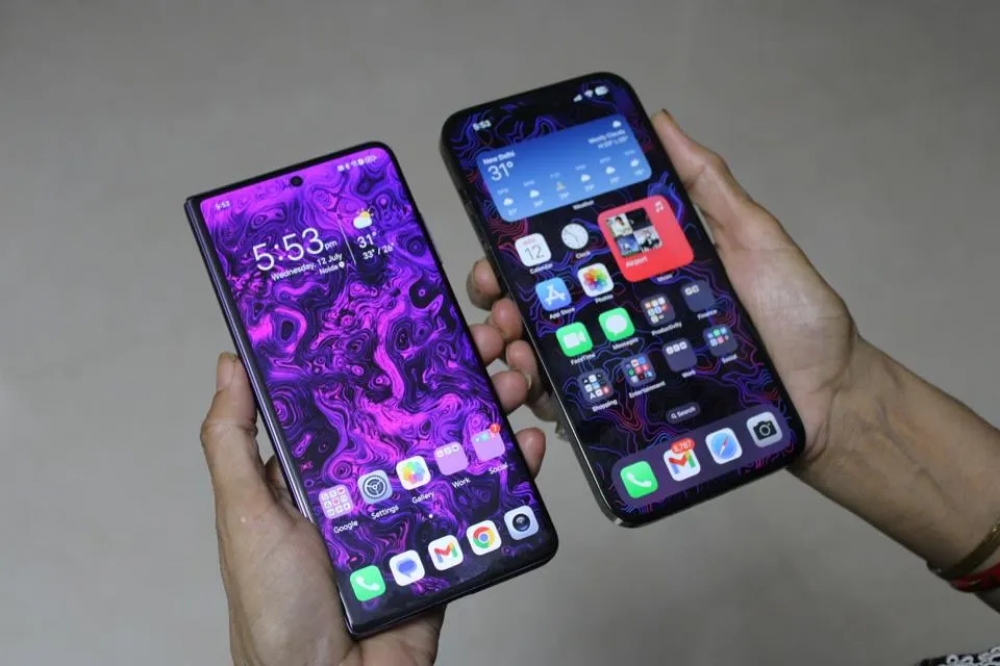Do iPhones Or Androids Last Longer?
- iPhone users tend to keep their phones longer than Android users.
- 61% of iPhone users keep their previous iPhones for two years or more, compared to 41% of Android users.
- Factors such as Apple's design evolution, perceived durability, and robust support system contribute to iPhone longevity.
- Android's diverse market and shorter update cycles also play a role in users upgrading more frequently.
- The debate between iPhone and Android superiority has shifted towards factors like repairability and software support.
In the dynamic world of smartphones, a fascinating trend has emerged: iPhone users exhibit a tendency to retain their devices for longer periods compared to their Android counterparts. This trend, illuminated by data from Consumer Intelligence Research Partners (CIRP), reveals that 61% of iPhone users hold onto their previous models for two years or more, a significantly higher percentage than the 41% of Android users who do the same. But what factors contribute to this notable divergence in device retention?
 Image credit: Forbes
One compelling aspect of iPhone longevity lies in Apple's design philosophy, which has evolved over the years with a balance of innovation and familiarity. Despite the annual release of new iPhone models, it's not uncommon to spot individuals still using older iterations like the iPhone 11 or X. Personal anecdotes echo this sentiment; many users, myself included, find themselves upgrading only out of necessity, often due to unforeseen accidents rather than dissatisfaction with their current devices.
Image credit: Forbes
One compelling aspect of iPhone longevity lies in Apple's design philosophy, which has evolved over the years with a balance of innovation and familiarity. Despite the annual release of new iPhone models, it's not uncommon to spot individuals still using older iterations like the iPhone 11 or X. Personal anecdotes echo this sentiment; many users, myself included, find themselves upgrading only out of necessity, often due to unforeseen accidents rather than dissatisfaction with their current devices.
The reasons behind this prolonged use of iPhones extend beyond mere brand loyalty. While Apple introduces new iPhones on a yearly basis, Android users face a multitude of options from various manufacturers, each with its own release schedule. CIRP's analysis suggests that iPhone users are perceived as more affluent and tech-savvy, while Android users are viewed as more budget-conscious. However, this perception doesn't align with the data, as only 10% of iPhone users upgrade within a year, compared to 21% of Android users.
Another significant consideration is the perceived durability of iPhones compared to Android devices. Many users report keeping their iPhones for over four years, citing their resilience. This durability, coupled with Apple's support, offers a compelling reason for users to hold onto their devices longer.
While the debate between iPhone and Android superiority was once heated, it has evolved over time. The focus has shifted from performance and design to factors like repairability and software support, which play a crucial role in determining the longevity of a device. As smartphones become increasingly integral to our daily lives, these considerations are likely to become more prominent in the purchasing decisions of consumers.
Recommended by the editors:
Thank you for visiting Apple Scoop! As a dedicated independent news organization, we strive to deliver the latest updates and in-depth journalism on everything Apple. Have insights or thoughts to share? Drop a comment below—our team actively engages with and responds to our community. Return to the home page.Published to Apple Scoop on 21st June, 2024.
No password required
A confirmation request will be delivered to the email address you provide. Once confirmed, your comment will be published. It's as simple as two clicks.
Your email address will not be published publicly. Additionally, we will not send you marketing emails unless you opt-in.